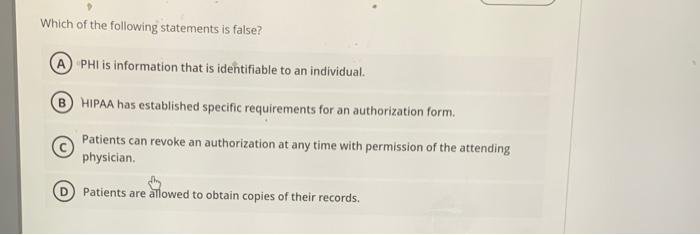
Curious to know which of the following statements about protected health information is false? Let’s dive right in and debunk any misconceptions surrounding this critical topic. Understanding the truth about safeguarding sensitive health data is essential in today’s digital age. So, grab a cup of your favorite drink and join me on this enlightening journey. Let’s separate fact from fiction and empower ourselves with the knowledge needed to protect our privacy. Let’s explore together!
Which of the Following Statements about Protected Health Information is False
Protected Health Information (PHI) is a critical aspect of healthcare data management, governed by strict regulations such as the Health Insurance Portability and Accountability Act (HIPAA). Understanding what constitutes PHI and the misconceptions surrounding it is essential for healthcare providers, organizations, and individuals handling sensitive medical information. In this comprehensive guide, we will debunk common myths and clarify misunderstandings about protected health information.
What is Protected Health Information (PHI)
Protected Health Information, as defined by HIPAA, refers to any information in a medical record or other health-related information that can be used to identify an individual and that was created, used, or disclosed in the course of providing a healthcare service, such as:
- Names and contact information
- Medical record numbers
- Health insurance beneficiary numbers
- Photographs
- Any other unique identifying numbers or characteristics
It’s crucial to note that PHI relates not only to paper and electronic records but also to conversations and verbal exchanges.
Common Misconceptions about Protected Health Information
1. Just Removing Names from Data Makes it Non-PHI
False. Merely removing the patient’s name from healthcare data does not render it non-PHI. Any information that could be used, either alone or in combination with other data, to identify the individual is still considered protected health information. Therefore, details like birthdates, Social Security numbers, and diagnostic codes must also be safeguarded.
2. De-identified Data Cannot Be Traced Back to the Patient
False. While de-identification techniques can reduce the risk of identification, they do not guarantee complete anonymity. De-identified data can potentially be re-identified by combining it with external information sources. Therefore, it is crucial to apply stringent privacy measures even to de-identified data to prevent re-identification.
3. PHI Only Includes Electronic Health Records (EHR)
False. Protected Health Information encompasses a wide range of formats beyond electronic health records. It includes any medium or form in which health-related data is stored or transmitted, including paper files, oral communications, and even video recordings.
4. Sharing PHI with Family Members Does Not Require Consent
False. While there are instances where sharing PHI with family members may be permissible without explicit consent, such as in emergency situations, the general rule is that patient authorization is required for any disclosure of protected health information. HIPAA mandates that patients must provide consent before their healthcare information is shared, even with family members, barring certain exceptions.
The Role of HIPAA in Protecting PHI
The Health Insurance Portability and Accountability Act of 1996, commonly known as HIPAA, sets the standard for protecting sensitive patient data. HIPAA establishes regulations that define who can access, use, and disclose protected health information and outlines the responsibilities of healthcare providers, insurers, and other entities handling PHI.
Key components of HIPAA include:
- Privacy Rule: Governs how PHI is used and disclosed
- Security Rule: Mandates safeguards to protect electronic PHI
- Breach Notification Rule: Requires reporting of breaches of unsecured PHI
- Enforcement Rule: Establishes procedures for investigations and penalties
Compliance with HIPAA regulations is essential to ensure the confidentiality, integrity, and availability of protected health information.
Best Practices for Protecting PHI
Given the importance of safeguarding PHI and the implications of mishandling sensitive healthcare data, it is imperative for healthcare organizations and individuals to adopt best practices in data security. Some key strategies include:
- Encrypting electronic PHI to prevent unauthorized access
- Implementing access controls to restrict who can view or modify PHI
- Regularly auditing systems and processes for compliance with HIPAA regulations
- Training employees on data security protocols and the importance of protecting PHI
- Developing incident response plans to address breaches or unauthorized disclosures promptly
By incorporating these best practices into their operations, healthcare entities can enhance their data security posture and mitigate the risks associated with PHI exposure.
Protected Health Information is a cornerstone of patient privacy and data security in the healthcare industry. Understanding the nuances of PHI, dispelling common misconceptions, and adhering to HIPAA regulations are vital for maintaining the confidentiality and integrity of sensitive medical information. By staying informed and implementing robust data protection measures, healthcare providers and organizations can safeguard patient trust and ensure compliance with regulatory requirements.
Which of the following statements about protected health information PHI is false?
Frequently Asked Questions
Which of the following statements about protected health information is false?
The false statement about protected health information is that it is only limited to paper records.
What does protected health information include?
Protected health information includes a wide range of data, such as medical records, conversations between healthcare providers, billing information, and any other information that can be used to identify an individual’s health condition.
Is consent required to disclose protected health information?
Yes, consent is generally required to disclose protected health information, except in cases where it is permitted or required by law without consent, such as for public health reasons or in emergencies.
Are all healthcare providers required to follow regulations regarding protected health information?
Yes, all healthcare providers, including doctors, hospitals, clinics, pharmacies, and health insurance companies, are required to follow regulations to protect the confidentiality of patients’ health information.
Final Thoughts
In conclusion, when considering protected health information, it is crucial to differentiate between what is true and what isn’t. Therefore, it is essential to address the statement that implies PHI can be freely shared without patient consent. This statement is false because HIPAA regulations mandate that PHI should only be disclosed with explicit patient authorization. So, remember to always verify the accuracy of information concerning PHI. Which of the following statements about protected health information is false – this is a critical question to keep in mind.






